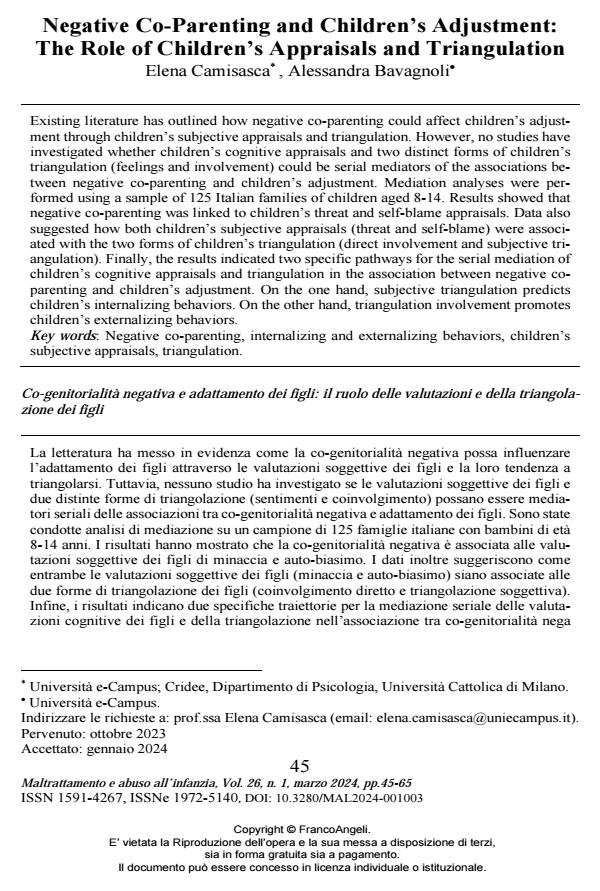Negative Co-Parenting and Children’s Adjustment: The Role of Children’s Appraisals and Triangulation
Journal title MALTRATTAMENTO E ABUSO ALL’INFANZIA
Author/s Elena Camisasca, Alessandra Bavagnoli
Publishing Year 2024 Issue 2024/1
Language English Pages 21 P. 45-65 File size 254 KB
DOI 10.3280/MAL2024-001003
DOI is like a bar code for intellectual property: to have more infomation
click here
Below, you can see the article first page
If you want to buy this article in PDF format, you can do it, following the instructions to buy download credits

FrancoAngeli is member of Publishers International Linking Association, Inc (PILA), a not-for-profit association which run the CrossRef service enabling links to and from online scholarly content.
Existing literature has outlined how negative co-parenting could affect children’s ad-justment through children’s subjective appraisals and triangulation. However, no stud-ies have investigated whether children’s cognitive appraisals and two distinct forms of children’s triangulation (feelings and involvement) could be serial mediators of the associations between negative co-parenting and children’s adjustment. Mediation analyses were performed using a sample of 125 Italian families of children aged 8-14. Results showed that negative co-parenting was linked to children’s threat and self-blame appraisals. Data also suggested how both children’s subjective appraisals (threat and self-blame) were associated with the two forms of children’s triangulation (direct involvement and subjective triangulation). Finally, the results indicated two specific pathways for the serial mediation of children’s cognitive appraisals and triangulation in the association between negative co-parenting and children’s adjustment. On the one hand, subjective triangulation predicts children’s internalizing behaviors. On the other hand, triangulation involvement promotes children’s externalizing behaviors. .
Keywords: Negative co-parenting, internalizing and externalizing behaviors, children’s subjective appraisals, triangulation
- Assessing children’s perceptions of the co-parenting relationship: preliminary validity of an adapted version of the co-parenting relationship scale Elena Camisasca, Alessandra Bavagnoli, Elisabetta Lombardi, Mark E. Feinberg, in European Journal of Developmental Psychology /2025 pp.94
DOI: 10.1080/17405629.2024.2425076
Elena Camisasca, Alessandra Bavagnoli, Negative Co-Parenting and Children’s Adjustment: The Role of Children’s Appraisals and Triangulation in "MALTRATTAMENTO E ABUSO ALL’INFANZIA" 1/2024, pp 45-65, DOI: 10.3280/MAL2024-001003